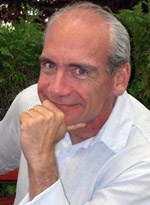It is an honour to join this august group of thinkers speaking about spirituality. As my first foray into this discussion, I would like to introduce myself through a story that illustrates how I see spirituality and our daily lives. In short, I don’t see that they are separate at all.
I am an ordained Anglican deacon, working out of Christ Church Cathedral in downtown Vancouver. Deacons are a unique order of ordained ministry as they are called specifically to work outside the church. Historically they worked with the poor, prisoners and marginalized and many of us still do. Some of us, like me, also work in other sectors in the economy. I for example work with boards and executive leaders in governance, leadership development and as a facilitator.
In my journey towards ordained ministry, I was advised by many very wise people saying things like, “ah yes, the deacon, the bridge between the holy world and the secular world.” And for some years I thought that. And then, in the midst of the ordination service, quite literally as the Bishop ordained me, I realized that there were not two worlds. There was one world. Many languages, including languages that might be described as holy or secular, but one world. And so my professional life is as much a translator as anything.
In the midst of this translating, I have seen many areas where a spiritual language or perspective could be very helpful in our daily lives. Here are just three examples.
1. Self-awareness: Elaine Pagel’s great translation of the apocryphal Gospel of Thomas contains this fascinating quote attributed to Jesus, "If you bring forth what is within you, what you bring forth will save you. If you do not bring forth what is within you, what you do not bring forth will destroy you." http://www.pbs.org/wgbh/pages/frontline/shows/religion/story/thomas.html The ancient wisdom seems to have understood early on that our deep dark secrets hold us back. Imagine who you might become if you were able to shed some light on your darkest secret?
2. Ethics: In our contemporary world, a common ethic is to work towards the good for the greatest number. It is therefore too bad that some of us cannot get enough to eat, or don’t have a roof over our heads, but as long as most of us do, that is good. However, that is not what the ancient wisdom was satisfied with. Consider the powerful image from the author of the Gospel of Matthew (25:31-46) where God is asked by “the [self] righteous” when they had seen God hungry, thirsty, as a stranger, or naked? And God answers, “Truly I tell you just as you did it to one of the least of these ... you did it to me.” A fully just world is not one based solely on modern capitalist ethics, but one where everyone is included. Imagine who you and I might become if we welcomed just one more stranger into our lives? If our board rooms and decision making tables were just that much more diverse?
3. Learning: For the past 175 (or so) years, especially in the West, we have built our learning and education on a model of a ‘teacher’ at the front of the room, telling a group of students lined up in rows what the right answer is. Memorization and getting the answers correct is deemed more important than exploration and generating more questions. (And I appreciate that there are many teachers and educators who work from within against this outdated model and we should each thank a teacher every single day.) But this industrial model is out dated and failing to provide our kids with the abilities and skills they will require in a world we cannot even begin to imagine. A rabbi who taught me in grad school taught me many things, and one stands out for me in this instance. “A good rabbi,” he said, “would never say, I will teach you this text. A good rabbi will always say, let us study this text together.” Imagine what our world would be like if rather than hierarchical answer seeking we set to work studying the texts (financial statements, political platforms, TV, movies, the environment etc.) of our lives together.
I so look forward to our continuing conversation as we explore the text of spirituality in our daily and working lives together.
 Alisdair Smith is Deacon and Business Chaplain at Christ Church Cathedral, Vancouver BC.
Alisdair Smith is Deacon and Business Chaplain at Christ Church Cathedral, Vancouver BC.
You can read more articles from our interfaith blog, The Spiritual View, HERE.
If you would like to write for this blog, you can contact us at [email protected]

